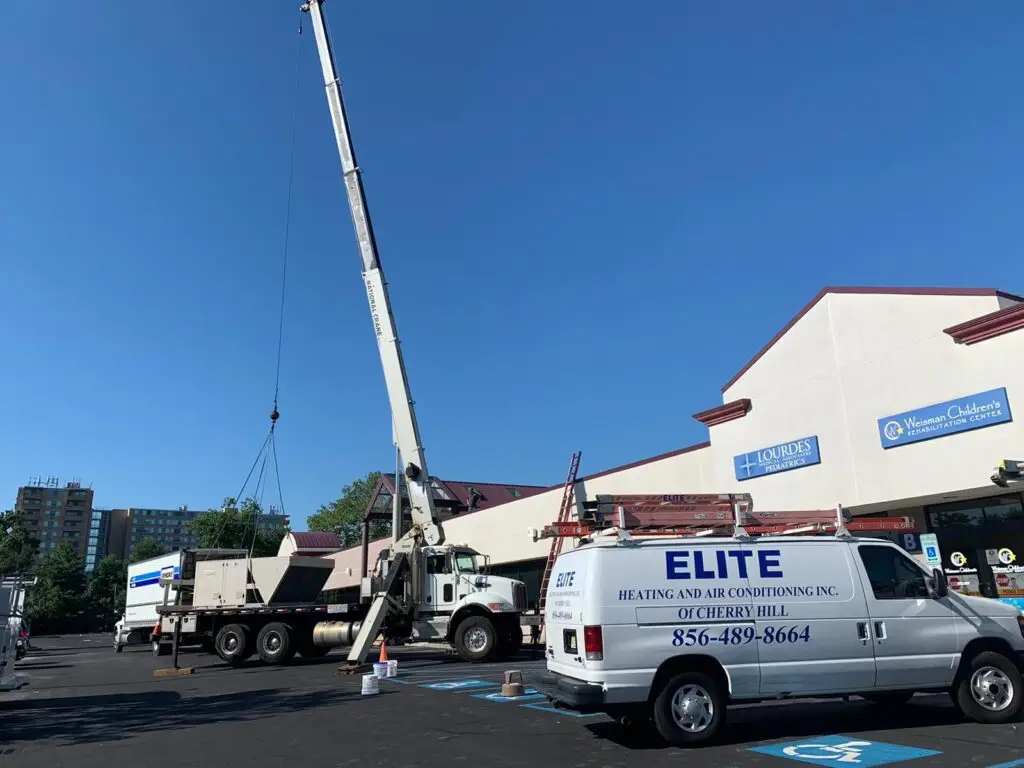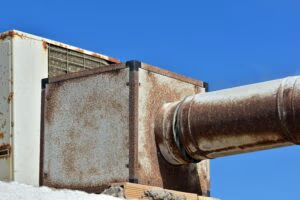New Jersey Property Owners Ask: Better to Repair or Replace the HVAC System?
As a commercial property owner in New Jersey, deciding whether to repair or replace the HVAC system is a major decision. HVAC systems are integral to maintaining a comfortable and efficient building environment, but like all mechanical systems, they can deteriorate over time.
Knowing when to repair and when to replace the HVAC can save you money in the long run, improve energy efficiency, and help you stay compliant with environmental regulations.
Multiple factors influence the decision. Consider all these things before choosing between repairing or replacing your unit.
Age of the HVAC System
One of the first things to consider when deciding whether to repair or replace your HVAC system is its age. The average lifespan of a commercial HVAC system is 10-15 years. If a system has received routine maintenance, it may last up to twenty years. However, as HVAC systems age, they lose efficiency, require more repairs, and eventually become costly to maintain.
Repair or Replace?
If the system is under 10 years old, repair may be more worthwhile. In a unit less than a decade old, the issue is likely a minor one, like a malfunctioning thermostat, leaky connection, or clogged filter. Because a system less than 10 years old is relatively new, parts are probably readily available and not cost-prohibitive.
But if your system is 15 years or older, replacement may be the better option.
The older it gets, the more likely it is that things will start to go wrong. If you’re ‘re seeing frequent issues or if parts are becoming harder to find (which increases repair costs), replacement will be the better option.
Refrigerant Type: The Environmental Impact
Another critical factor in the decision to replace is the type of refrigerant your HVAC system uses. Older systems typically use R-22 refrigerant (Freon), which has been phased out due to its harmful effects on the ozone layer. The production of R-22 ceased in 2020, and it is no longer available for new systems. Furthermore, replacing or recharging R-22 systems can be expensive due to its limited availability.
If your system uses R-22, it’s generally more cost-effective to replace the unit rather than invest in repairs. R-22 systems are becoming increasingly expensive to maintain, and continued operation may be unsustainable.
Newer systems use R-410A refrigerant, which is more environmentally friendly and compliant with modern energy standards. Not only are they more energy-efficient, but they also comply with current environmental standards, supporting green building initiatives.
New refrigerants are on the way. Next year, equipment will be manufactured which supports a new refrigerant A2L. A2L is non-toxic and has a lower Global Warming Potential rating (GWP.) Keeping in mind that in the next few years, all new HVAC systems will operate on a different refrigerant may help determine what repairs to make and when to make the purchase of a new unit.
Energy Efficiency and Operating Costs
Are your utility bills skyrocketing?
Older HVAC systems can be energy hogs, consuming more power than their newer, more efficient counterparts. A modern HVAC system is designed to use less energy while providing the same or better performance, leading to lower utility bills.
If your system is over 10 years old, replacing it with a high-efficiency model can reduce your building’s energy usage by up to 30% or more.
Newer systems often come with advanced features, such as variable-speed fans and smart thermostats, that optimize energy usage based on real-time conditions, further reducing operating costs.
It’s not just about the mechanical age of the unit. It’s about the impact of aging equipment on overall operating costs.
What’s It Going to Cost?
When considering whether to repair or replace your system, one of the most important factors is the cost of repairs compared to the cost of a new system. If your system is older and has broken down frequently, the cost of continued repairs may soon surpass the cost of installing a new unit.
If the repair costs are approaching 50% or more of the cost of a new system, replacement is the better financial option.
Repeated breakdowns in older systems can lead to higher operational costs, making long-term repairs inefficient compared to the stability of a new unit.
No doubt, new equipment can be expensive, but it will lower costs, make the building more comfortable, and increase Tenant satisfaction. Many manufacturers offer financing with agreeable terms.
Tax Incentives and Rebates for New HVAC Systems in New Jersey
One of the most compelling reasons to replace an old HVAC system with a modern, energy-efficient model is the availability of financial incentives in New Jersey. The state offers various programs to help commercial building owners offset the initial cost of a new HVAC system, particularly if it is energy efficient.
- New Jersey’s Clean Energy Program (NJCEP): The NJCEP offers a variety of rebates and incentives for energy-efficient upgrades, including HVAC system replacements. Businesses that install ENERGY STAR-rated equipment or make other energy-efficient improvements may qualify for rebates that help reduce the upfront cost. The program also provides financial incentives for buildings that undergo energy audits to determine areas for efficiency improvements.
- New Jersey Board of Public Utilities (NJBPU) – Direct Install Program: This program helps small and medium-sized businesses in New Jersey make energy-efficient upgrades by providing funding for equipment replacement. It can help cover a portion of the cost of replacing an outdated HVAC system with a high-efficiency model. Elite Heating and Air Conditioning is a Direct Install Trade Ally.
- Utility Company Rebates: New Jersey utility companies, such as PSE&G and JCP&L, also offer rebates for businesses that install energy-efficient HVAC systems. These rebates vary depending on the size and efficiency of the system being installed.
More Federal Incentives and Tax Credits
The federal government offers tax incentives for energy-efficient upgrades to commercial buildings under Section 179D. Building owners can claim deductions for installing energy-efficient HVAC systems, which can reduce the overall cost of the upgrade.
In addition, the Inflation Reduction Act, (IRA) offers federal tax credits for upgrades to more efficient systems, which may earn up to as much as 30% of the installation costs.
When you factor in the available tax credits and rebates, replacement may be a much less costly option than repair.
The Environmental Impact and Sustainability Goals
Reliability and Comfort: The Tenant Experience
A failing HVAC system can create discomfort for your tenants and may even result in tenant dissatisfaction. Frequent repairs or uncomfortable indoor conditions can lead to complaints and even tenant turnover. A new HVAC system provides improved reliability, better temperature control, and more consistent comfort throughout the building.
Tenants in energy-efficient buildings tend to report higher satisfaction levels, which can be a key selling point if you are leasing space in your commercial building. It’s also a key factor in Tenant retention, an important part of profitability.
Increased Property Value
Replacing instead of repairing your HVAC system can also increase your commercial property’s market value. Modern, energy-efficient HVAC systems are appealing to tenants and investors who are looking for buildings with lower operating costs and a commitment to sustainability.
If you plan to sell the building or lease space in the future, a new HVAC system can make your property more attractive to potential tenants or buyers.
Upgrading to an energy-efficient system can help your building stand out in a competitive market.
Big Decision: Repair or Replace the HVAC System?
Deciding whether to repair or replace your HVAC system comes down to several factors, including the age of the system, the type of refrigerant it uses, repair costs, and overall efficiency. If your HVAC system is old, inefficient, or uses outdated refrigerants like R-22, replacing it with a modern, energy-efficient model is likely the best investment for your commercial building.
Moreover, financial incentives and tax rebates can help significantly reduce the upfront cost of a new system. By taking advantage of these programs, you can make the transition to a more efficient HVAC system both affordable and environmentally responsible.
Talk to Elite Heating and Air Conditioning about your options. As experts in the commercial HVAC industry for more than 25 years, Elite can provide insight on the factors that impact your existing system and ideas on the best path forward.
“No excuses. Just results.”
Call us.

- commercial hvac, Commercial HVAC experts, commercial HVAC repair, cost-effective HVAC solutions, Elite Heating and Air Conditioning, Elite HVAC, Elite HVAC of South Jersey, HVAC decision-making, HVAC maintenance, HVAC replacement tips, HVAC system lifespan, New Jersey HVAC incentives, New Jersey property owners, property management, Refrigerants, repair or replace HVAC, South Jersey, South Jersey HVAC services


